EXCLUSIVE: Georgia governor ignored experts as the pandemic raged
Gov. Brian Kemp already had reopened bars and restaurants, gyms and nightclubs, barber shops and tattoo parlors, amusement parks and summer camps. Next up: live entertainment venues.
That’s when Dr. Kathleen Toomey spoke up.
Toomey, Georgia’s public health commissioner, thought it would be impossible to stop the coronavirus from spreading through crowded concert halls, convention centers and sports stadiums. So she had her lawyer write the governor’s lawyer to register her concerns.
Three days later, Kemp reopened the entertainment venues, anyway.
This episode last June illustrates how, throughout the worst public health crisis in a century, Kemp repeatedly disregarded advice from Toomey, federal scientists and other experts, an examination by The Atlanta Journal-Constitution found.
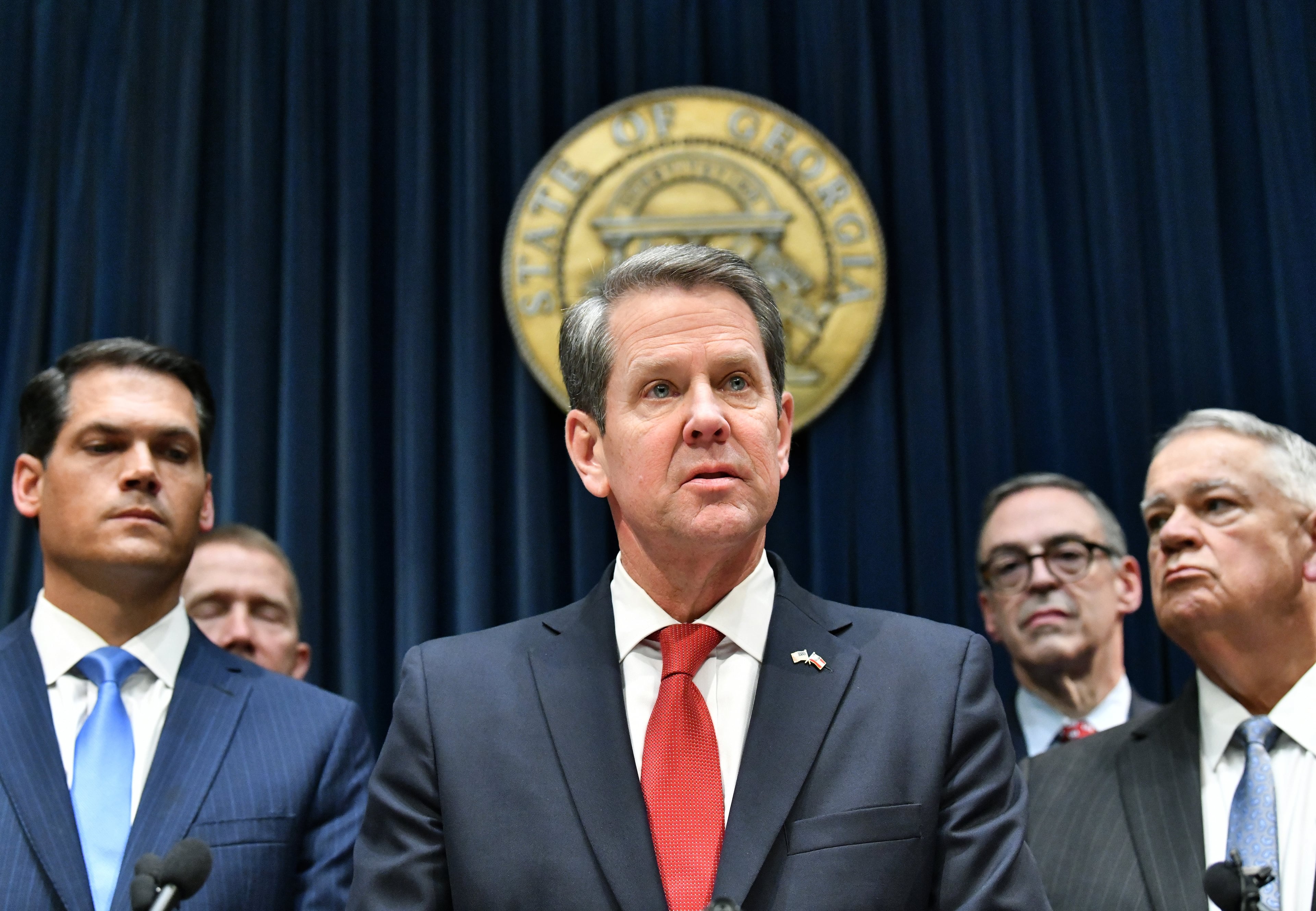
Kemp describes his handling of the pandemic as informed by science, data and the judgment of experts. He has striven, he says, to preserve both “lives and livelihoods.”
But most often, the Journal-Constitution found, Kemp ranked economic concerns ahead of public health imperatives.
Kemp was one of the nation’s last governors to issue lockdown orders last spring — and then the first to begin lifting them, 22 days later. He never required Georgians to wear face coverings in public, even as 36 other states and the District of Columbia imposed mask mandates and as a White House task force strongly lobbied him to follow suit. And as hundreds of thousands of Georgians contracted COVID-19, the disease caused by the coronavirus, and the death toll rose from hundreds to a few thousand to, now, approaching 20,000, Kemp declined to adjust his strategy and put into place new restrictions to slow the virus’ spread.
“It’s the community that defeats this virus, not the government,” he said last July 17.
“It’s going to be our citizens that flatten the curve by using best practices,” he said — 6,000 deaths later — on Dec. 7.
And on March 3 this year, after 9,000 more deaths in Georgia, Kemp said: “You don’t need a mandate to get people to do the right thing.”
Public health experts acknowledge that reversing the economy’s free fall last spring was critical. But they say if Kemp had put an equal priority on containing the virus, Georgia could have averted increasingly severe surges of infections and deaths.
“It’s one thing to say you’re following the science; it’s another thing to shoehorn the science into what you want it to be,” said Amber Schmidtke, a public health researcher who formerly taught at Mercer University’s medical school. “A lot of people were hurt, and a lot of people died when they didn’t need to.”
The Journal-Constitution assessed Kemp’s pandemic response by reviewing more than 15,000 pages of emails between Toomey and the governor and his staff, along with other documents, including reports by the White House coronavirus task force.
This examination found Kemp’s administration was slow to act on early warnings about the pandemic’s severity. The governor’s aides, not public health officials, often determined strategy to contain the virus and dictated public messaging. And the state withheld critical information showing the pandemic was worsening as Kemp lifted restrictions.
In a statement on Friday, Cody Hall, the governor’s communications director, said Kemp has “relied heavily on the advice and counsel of Dr. Toomey for literally thousands of decisions — and still does to this day.” Hall disputed some of the Journal-Constitution’s conclusions and said many other states “fared no better against COVID-19 than Georgia did” despite having imposed stricter controls.
Both Kemp and Toomey declined to be interviewed. Members of their staffs were not authorized to speak on the record.
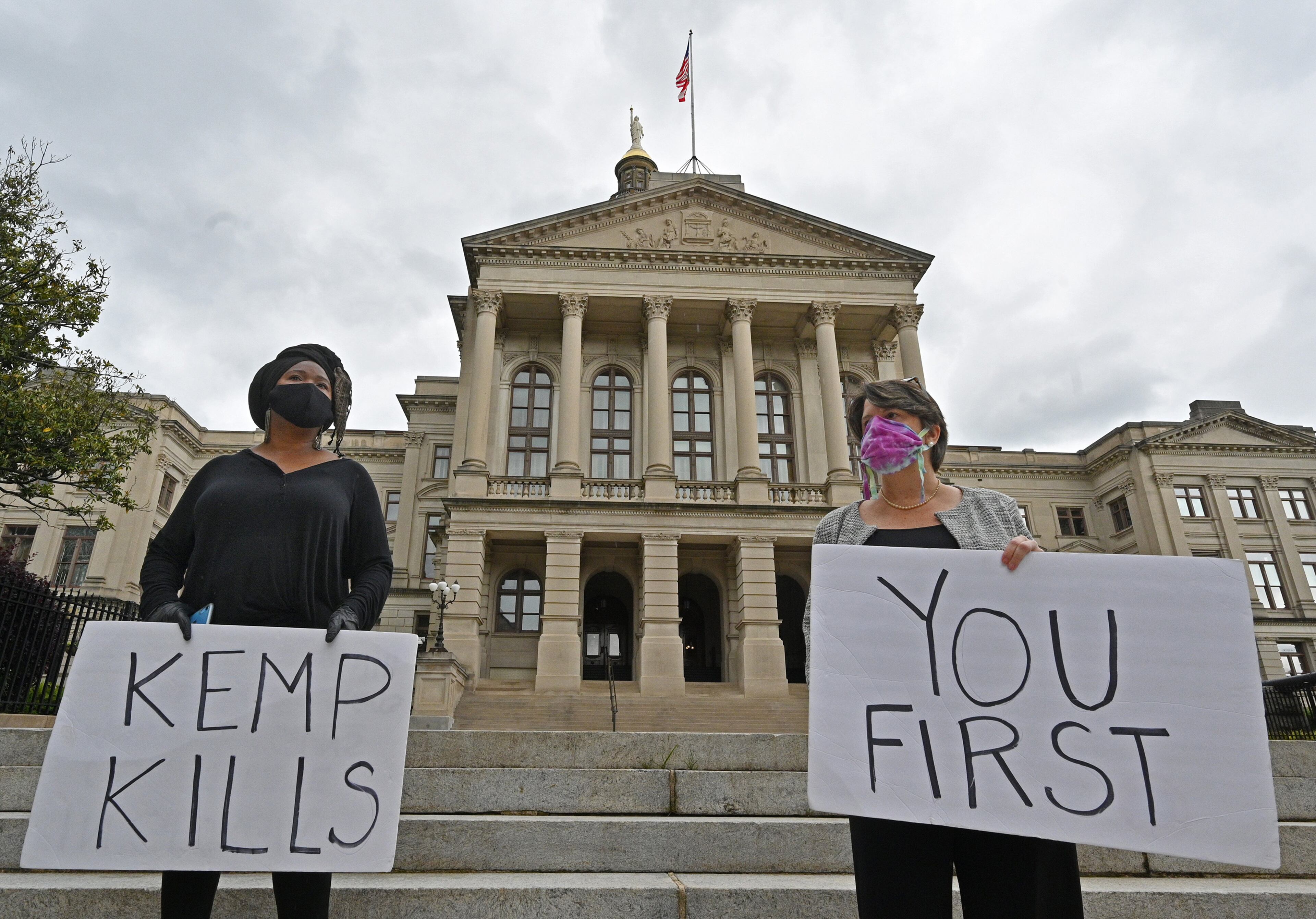
Kemp has consistently dismissed criticism over his handling of the pandemic, an unforeseen catastrophe that nonetheless is likely to define his legacy as governor. He points to the state’s recovering economy as evidence that he took the correct course.
“We had to make some very tough choices during extraordinary times, and there is no playbook for this,” Kemp said during a recent news conference. “Looking back one year, every day is a reminder of the things that we went through, the tough decisions that we made.”
The interplay between Kemp and Toomey — a seemingly mismatched duo of politician and scientist — drove Georgia’s pandemic response from the start.
“It's one thing to say you're following the science; it's another thing to shoehorn the science into what you want it to be. A lot of people were hurt, and a lot of people died when they didn't need to."
Kemp is a businessman who entered politics almost 20 years ago. He exudes swagger and speaks in aphorisms, threatening to personally confiscate hoarded doses of the coronavirus vaccine and advising Georgians worried about the virus to “hunker down and keep choppin’.”
Toomey is a Harvard-educated physician with a four-decade career in public health. She worked in AIDS research, ran the Centers for Disease Control and Prevention’s outpost in Botswana and has twice served as the state health commissioner. In public, she is soft spoken and deferential to her boss, who appointed her in 2019. She never overtly corrects Kemp’s misstatements and rarely veers off message.
“It’s not simply a public health decision,” Toomey said in an interview last year about Kemp’s reluctance to impose a statewide lockdown. “There are also political implications I can’t possibly imagine and economic issues that I do not know about.”

Women in positions like Toomey’s have less freedom than their male counterparts to express contrary opinions, said state Rep. Rebecca Mitchell, D-Snellville, an epidemiologist who worked in Botswana at the same time as Toomey.
“You would lose your seat at the table,” Mitchell said. “It’s an incredibly fraught position to stand in if you and the politicians aren’t on the same page.”
But by not publicly challenging Kemp, Toomey enabled the governor’s “anti-science” agenda, said Dr. Melanie Thompson, a nationally known researcher who founded and was the principal investigator for the AIDS Research Consortium of Atlanta.
“She is between a rock and a hard place,” Thompson said of Toomey. “If you push back too hard, you’re going to get fired. If you keep your job, you think you can do something positive. But it leaves us in a situation where the governor likes to say he’s following the science and yet he doesn’t. He likes to say he takes Doctor Toomey’s advice. I don’t know what advice she has given him, but I doubt that he has taken much of it.”
Early warnings
After the intense early weeks of the pandemic, Toomey took a moment to reflect.
“This is a wild ride,” she wrote to an official in the governor’s office. “Makes Ebola look easy because of the spread.”
By then, in late March, Toomey and others in Kemp’s administration were well aware of how bad the pandemic could get.
On March 2, Toomey and Homer Bryson, then director of the Georgia Emergency Management Agency, had received a risk assessment from Pinar Keskinocak, a professor of systems engineering who runs Georgia Tech’s Center for Health and Humanitarian Systems. Keskinocak advises governments on epidemics and other health calamities and worked with Georgia education officials during the H1N1 flu outbreak in 2009.
Keskinocak’s analysis was prescient.
“Given what we know of the community transmission patterns of the coronavirus, it is important for the public, businesses and governments to evaluate mass gatherings,” she wrote. “It is possible that we may see multiples ‘waves’ of this disease, as the virus mutates over time. It is important to consider preparation plans not just for short term — or a year — but also longer term as well.”
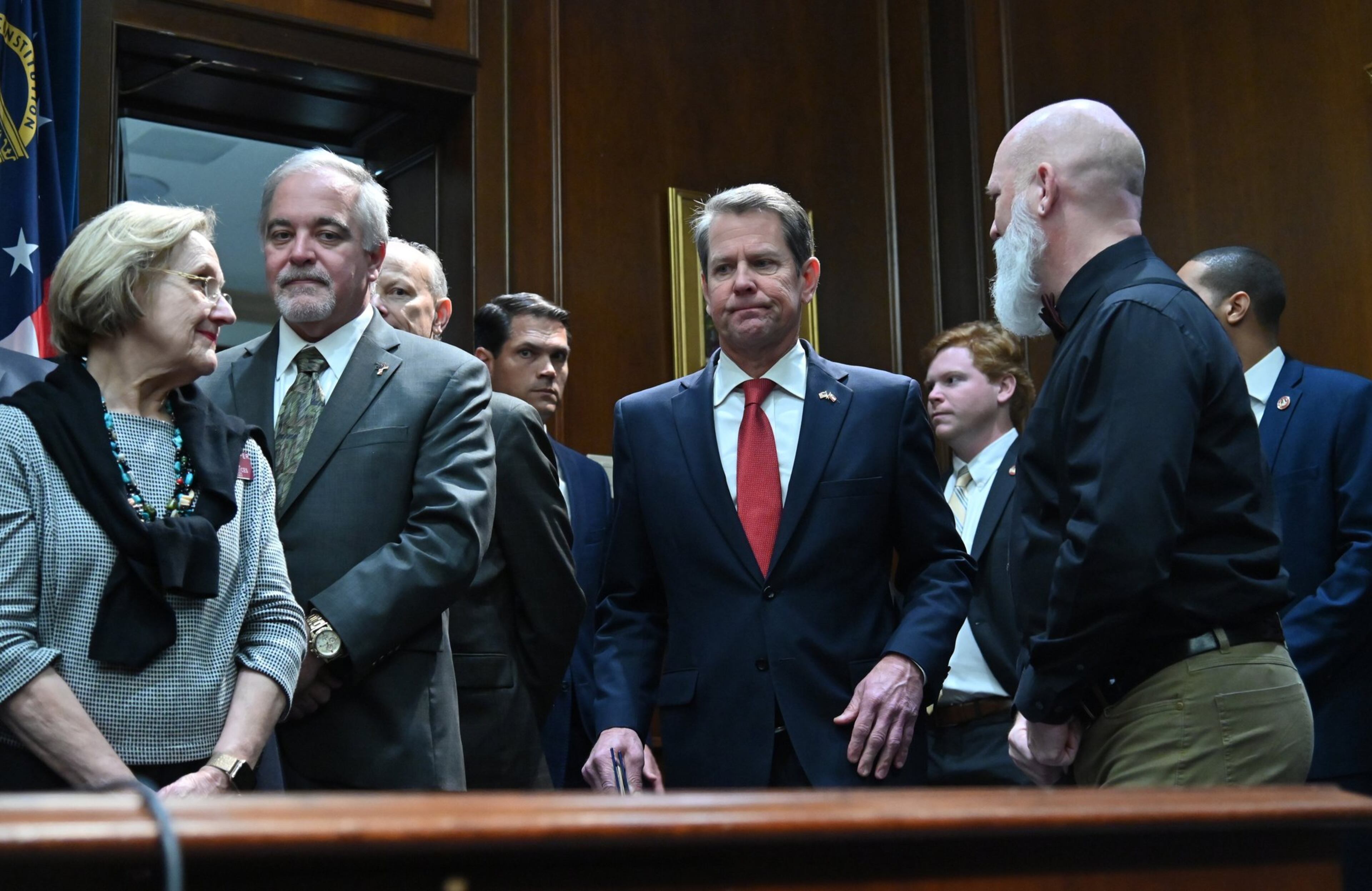
In an interview, Keskinocak said she didn’t know whether state officials acted on her assessment, which she submitted the same day Georgia confirmed its first two coronavirus cases.
Regardless, hers was the first in a series of alerts calling attention to the pandemic’s severity.
“Currently, there is moderate — and in several places, even widespread — community transmission of COVID-19 in many parts of Georgia,” Dr. Cherie Drenzek, the state epidemiologist, wrote in a “situation report” to Kemp and his staff on March 19. “Rather than focusing on individual cases, we will be focusing (on) COVID-19 outbreaks in congregate settings. … People should practice social distancing and remain home when ill.”
The state had confirmed 293 cases of the coronavirus so far. Twenty-five people had died.

Three days later, Dr. Sangmin Ryan Shin, a physician with Kaiser Permanente in Atlanta and a member of the state Board of Public Health, sent Toomey a more ominous warning.
Georgia was reaching an “inflection point,” Shin told Toomey, citing models projecting a spike in infections and fatalities in the coming days. He recommended that Kemp use a “hammer” to head off the surge: a full lockdown for most Georgians. “We, (Kaiser Permanente) nationally, strongly recommend ‘shelter in place.’”
Toomey forwarded Shin’s email to two officials in Kemp’s office. Neither responded.
Despite the warnings, Kemp refused for weeks to shut down businesses or impose other restrictions. Even when he announced Georgia’s first restrictions — the closure of bars and nightclubs — he described more extreme measures adopted by other states as “overreach.”
It wasn’t until April 2, a month after Keskinocak’s analysis, that Kemp closed many businesses and ordered Georgians to stay home except for essential errands. Thirty-nine governors already had issued similar orders.
But then, just 22 days later, Kemp allowed gyms, nail salons, bowling alleys and many other businesses to reopen. He let restaurants resume dining-room service on April 27.
Toomey stood by Kemp’s side as he ended the lockdown. Even some of her admirers were shocked by her acquiescence.
“This approach flies in the face of science and evidence,” Dr. Richard Ackerman, a physician in Macon, wrote to Toomey. “I might expect a politician to forward such a suggestion, but as the leader of public health in Georgia, you know better. You must stand up and tell the truth, no matter the consequences.”
Ackerman did not respond to recent requests for an interview.
Toomey forwarded the email to the governor’s office, without comment.
After the lockdown ended, Kemp relied on Toomey to assert Georgia had sufficiently tamed the coronavirus to safely get back to business.
“The data are encouraging — and support a measured approach to reopening previously closed businesses and lifting the shelter-in-place order for people who are non-medically fragile or seniors,” Toomey told the governor’s coronavirus task force on April 30.
Her remarks that day were not entirely her own words. Her statement came from the governor’s staff, delivered to Toomey by email hours before the meeting.
Lack of autonomy
The governor’s office approved Toomey’s remarks for weekly telephone briefings of state legislators. It oversaw her responses to inquiries from federal health officials. It produced a video in which she rebutted her own off-script comments during a press conference.
Kemp even assigned a top aide to work alongside Toomey as her acting chief of staff.
Caylee Noggle, Kemp’s chief management officer, had no experience in public health. Before joining the governor’s staff, she ran the agency that oversees Georgia’s Hope scholarship.
Hall, Kemp’s communications director, said Toomey asked the governor to assign Noggle to the Department of Public Health. Regardless, the appointment appeared to create tension from the start.
“I’m sure this will be met with lots of questions,” Noggle wrote to Toomey on May 7, after reviewing a draft of an announcement to the department’s staff, “so the only thing I might add for now is that this was based on our collective agreement — this wasn’t a mandate, but based on your decision with me.”
Toomey answered, “I think that’s clear from the messaging that I’m happy for you to be on board.”
“Ha — gotcha!” Noggle wrote back. “That’s great!”
Already, Toomey had little autonomy from the governor’s office, where Kemp’s aides often decided how and whether her department would share information on the pandemic. Hall said Toomey was free to edit the talking points, speeches and other remarks that Kemp’s aides drafted for her, but the governor’s office wanted to “ensure consistent and accurate information was being provided to the public.”

In April, the governor’s office told Toomey it wanted to give local government agencies, such as 911 call centers, the names and addresses of everyone in their communities who tested positive for the coronavirus — a list of people of whom first responders should be wary.
Toomey strongly objected.
That data could feed misinformation while also breaching patient confidentiality, she said. “I do not believe the 911 needs to know every single person infected.”
Tim Fleming, then Kemp’s chief of staff, pushed back. “This is becoming a serious issue at the local level with first responders,” he wrote to Toomey. “If we need to ask the (attorney general) for guidance, we can.”
When Toomey offered a compromise that would protect individual privacy, Fleming dismissed it.
“I do not believe that this addresses the problem we are actually trying to solve here,” he wrote. “We will work on a draft of what the Governor wants to do and send it over.”
The state soon began sharing the information with local governments. At least one county sheriff posted “positive COVID-19 addresses” on Facebook.
‘Striking increases’
The afternoon of May 12, Kemp stood before a bank of socially distanced television cameras in the Capitol to announce good news. Hospitalizations caused by the virus were declining, he said, and fewer patients needed ventilators to breathe. The rate of positive coronavirus tests was falling, too.
Kemp said he was ending more coronavirus restrictions: Daycare centers could increase their capacities, and day camps could open for the summer. These actions, he said, were “based on data, science and the advice of our public health officials.”
Actually, Kemp repeatedly rejected advice from Toomey and other health officials as the pandemic’s second wave gathered in the late spring and early summer. Kemp touted a “slow, careful transition to a ‘new normal’” as he allowed more and more crowd-intensive activities to resume, despite the surge of new cases and deaths.
“This approach flies in the face of science and evidence. I might expect a politician to forward such a suggestion, but as the leader of public health in Georgia, you know better. You must stand up and tell the truth, no matter the consequences."
In May, officials at the Department of Public Health objected after they learned Kemp might reopen amusement parks.
“From a (public health) perspective, I have concerns with a large number of people, especially children that are difficult to social distance, congregating,” Chris Rustin, director of the department’s division of health protection, wrote to the governor’s office. Safety protocols submitted to the governor’s office by Six Flags Over Georgia, Rustin wrote, “will be challenging to realistically operationalize … on such a large scale.”
One day later, Kemp announced that amusement parks were free to reopen.
Bars and nightclubs began reopening June 1, and within days the governor’s office told Toomey that live entertainment venues would be next.

Toomey thought this was a bad idea because of the crowds the venues might attract. But rather than appealing directly to Kemp, she and Drenzek, the state epidemiologist, asked their agency’s general counsel to draft a formal objection.
“While they understand that it is important to reopen the state economy as quickly as possible, they recommend a more cautious approach,” lawyer Kristin Miller wrote.
“Without social distancing among spectators and patrons, they believe further spread of COVID-19 is likely,” Miller added. “They feel it is too early to consider opening these venues for large gatherings.”
David Dove, Kemp’s general counsel, replied: “I will pass your recommendations to the governor and staff.”
Kemp wasn’t swayed. He signed an executive order reopening the venues three days later.
Miller, who has since left the public health agency, declined to comment.
As Kemp worked to restart the economy, ominous trends were emerging. Drenzek reported on June 18 that case numbers had increased by 30% in a week. And while earlier clusters had mostly affected long-term care facilities, she wrote, now there were “many more outbreaks among employees at workplaces.”
Just in the past week, she added, hot spots included grocery stores, a tire store, an automobile dealership, a bank, fast-food restaurants, a sports bar, a body shop and several Walmarts.
“Outbreaks in churches are also trending upward,” she wrote.
On June 29, Drenzek’s situation report for the governor noted, in bold type, “Daily Case Counts are consistently higher than they have ever been in Georgia.”
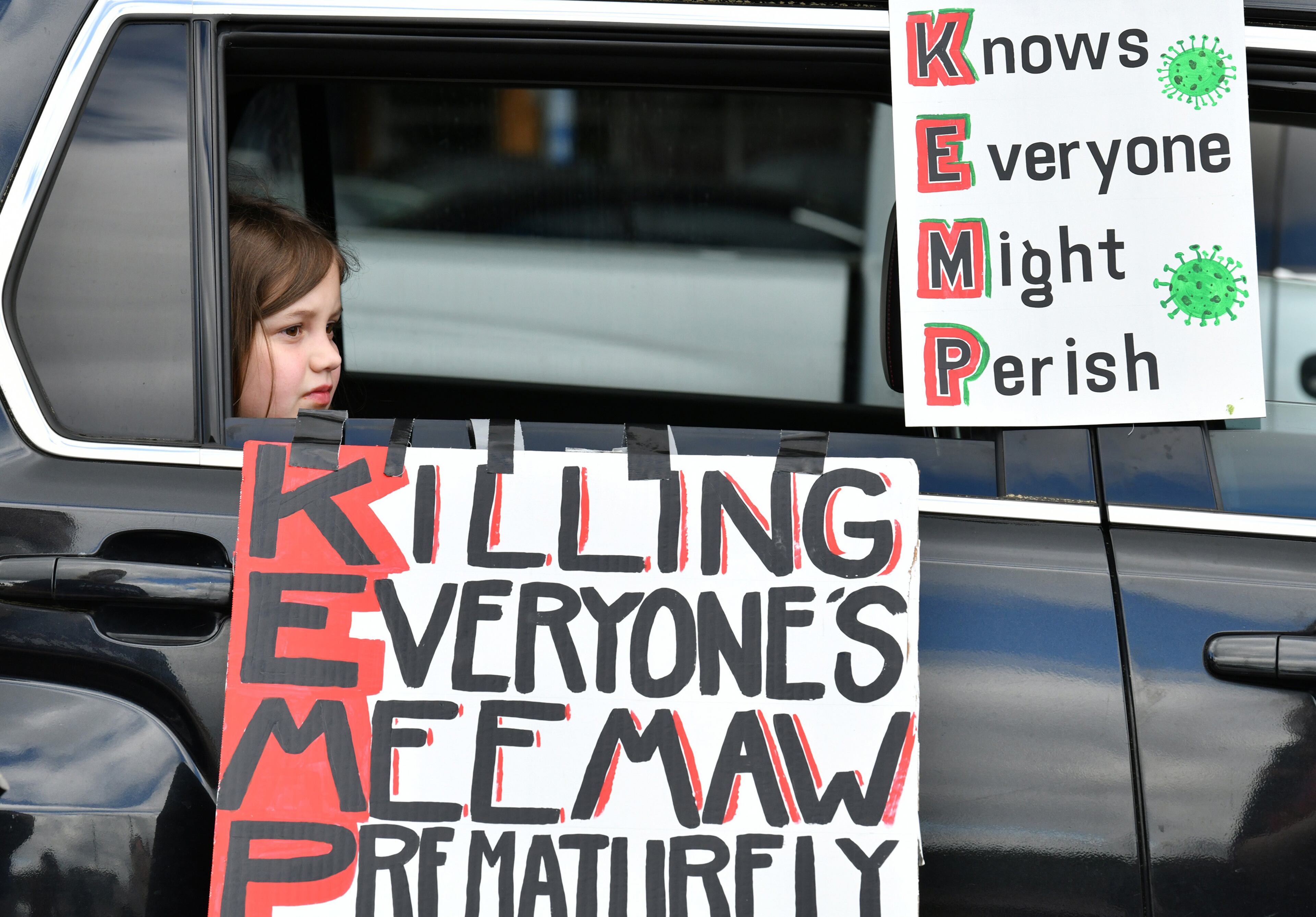
Then, on June 30, Drenzek reported “striking increases” in coronavirus numbers. Cases were up another 63%, and only 17 of Georgia’s 159 counties were reporting fewer than 50 cases per 100,000 residents.
None of Drenzek’s reports were made public at the time, however, and Kemp’s order opening entertainment venues took effect on July 1.
That day, Kemp and Toomey left Atlanta for a two-day flyaround, urging residents of Columbus and Albany, Valdosta and Dalton, Augusta and Brunswick to observe social distancing, wash their hands frequently, and — voluntarily — wear masks.
Sidestepping questions
While Kemp was on the flyaround, a letter from 1,400 Georgia health care workers arrived in his office. It contained a grim forecast of additional suffering from an unchecked virus.
“Georgia is simply not prepared for a surge in cases and hospitalizations,” the health care workers told Kemp. “You have the power to do much more to save lives and protect our citizens from avoidable illness.”
The health care workers asked Kemp to close bars and nightclubs again and to prohibit indoor gatherings of more than 25 people. Most important, they pleaded with Kemp to mandate that Georgians wear facial masks in public. Federal health officials say facial coverings are the most effective means of containing the virus, and early research supports that contention. One study, reported last month by the Centers for Disease Control and Prevention, found that COVID-19 hospitalizations decreased by as much as 5.6 percentage points within four weeks after states mandated mask usage.
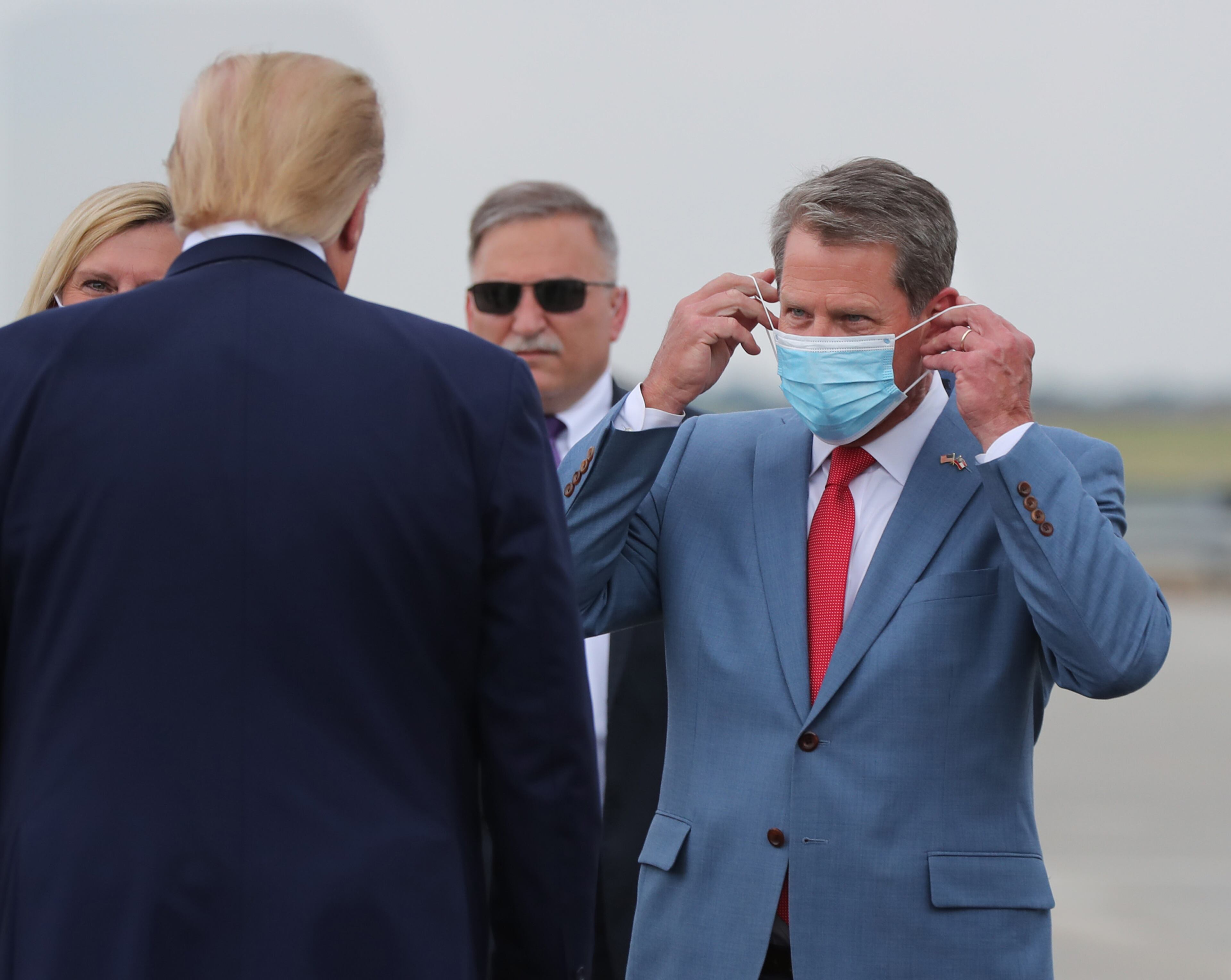
Neither Kemp nor his aides responded to the letter — or to a follow-up a month later, signed by more than 2,100 health care workers.
“It’s pretty clear this governor keeps his eye on the politics, not on the science,” said Melanie Thompson, the AIDS researcher, who was one of four lead signers of the letter. “Our input didn’t jibe with what he wanted to do.”
It is not clear whether Toomey, like an overwhelming majority of other public health officials, favors a mask mandate. Her public statements have avoided taking a stand that might conflict with Kemp’s.
“It's pretty clear this governor keeps his eye on the politics, not on the science. Our input didn't jibe with what he wanted to do."
Asked last June, during a virtual question-and-answer session sponsored by the Metro Atlanta Chamber, whether a mask mandate would reduce coronavirus infections and save lives, Toomey said, “Wearing masks is an effective and easy tool to reduce the spread of the virus in our communities.”
Then, asked whether she supported a mandate, she replied, “The governor and I are strongly recommending that Georgians wear masks when social distancing isn’t possible.”

With mandatory mask usage off the table, Georgia officials scrambled in July to explain the state’s strategy to the White House coronavirus task force. Federal officials thought Georgia should close bars again and limit restaurant seating in counties where the virus was spreading fast — and mandate the use of masks.
Several officials at the Department of Public Health punted. Justifying the lack of a mask mandate, one wrote, was “a little bit outside our purview.”
Ultimately, Toomey asked two officials in the governor’s office to approve an answer that sidestepped the question: “Masks are recommended for all settings where social distancing cannot be observed.”
Ryan Loke, Kemp’s health care adviser, signed off on sending the response to the White House.
“All good,” he wrote.
Never a mandate
The degree to which Toomey influenced Kemp’s decisions about the coronavirus may never be known. As the pandemic moved into its second year, he invoked her advice less frequently in public, especially as other states began relaxing coronavirus restrictions.
On March 3, Kemp used an interview on CNBC to promote his business-friendly coronavirus strategy, saying he had taken a “measured approach” from the start.
“We’ve been open for the most part the whole time,” Kemp said. “We did two things at once. We protected lives, but we also had to protect livelihoods and keep our businesses going.”
He reminded the interviewer he had never required Georgians to wear face masks.
“It was never about a mandate,” he said. “You don’t need a mandate to get people to do the right thing. Our numbers are as good or bad as anybody else.”
That day, Georgia’s death toll from COVID-19 reached 15,349. Its death rate remained higher than that of 35 other states. It ranked at or near the bottom of states in administered coronavirus vaccines.
On Friday, the number of confirmed deaths reached 16,417, with another 2,432 reported as probably caused by the coronavirus. Kemp was on Jekyll Island, where he offered a preview of the next phase of his pandemic response.
“Hardworking Georgians can’t endure another year like the last,” he said on Twitter. “Next week, we’ll roll out our plan to loosen the remaining COVID restrictions in the state. Georgians know the right thing to do. We are open. We have been open, and we’re ready to welcome you to the Peach State.”
About this story
This story is based in part on 15,751 pages of emails obtained under the Georgia Open Records Act. The Atlanta Journal-Constitution requested the documents from the state Department of Public Health on May 13 last year. The agency initially said it had suspended its compliance with the records law for the duration of the coronavirus emergency. In July, it said it would provide the records at a cost of about $2,700. The newspaper paid the retrieval fee, but the agency did not turn over the documents until Jan. 28 — 8 1/2 months after the law requires and then only after the Journal-Constitution threatened legal action.

